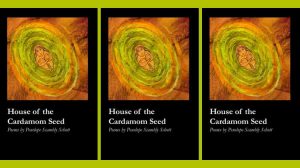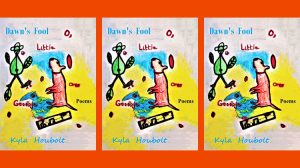Writing Your Name On the Glass by Jim Whiteside / Bull City Press / 35 pages / 978-1-949344-08-0 / 2019
fugue (n.)
- in music, a contrapuntal composition in which a short melody or phrase (the subject) is introduced by one part and successively taken up by others and developed by interweaving the parts.
- in psychiatry, a state or period of loss of awareness of one’s identity, often coupled with flight from one’s usual environment, associated with certain forms of hysteria and epilepsy.
It is significant that Whiteside’s poems begin with a fugue. In Latin, the verb fuga means to run. And these poems use running as a form of poetic motion, a movement that is both lyrical and essential to the questions of queer identity in many southern states.
The first poem, “Little Fugue”, starts in the key of dolor, in the memory of a paternal figure making musical instruments:
Sometimes, the memory of him playing
runs backwards. The notes leave the room, return
to the end of his instrument, back to his body.
In the next stanza, the subject of the poet’s sexuality is introduced, and it is taken up again, and developed throughout the text.
The first time I knelt for a man, my hands shook,
reaching for his waistline. His smooth torso shone.
The moon in the window was a fully-clenched fist.
 The other meaning of fugue, namely, a state of loss of awareness of one’s identity or dissociation, feels near as the point-of-view slips from inhabited presence to a sort of winged, levitated presence. These shifts and slips in the narrator’s proximity occur through many of the lineated poems.
The other meaning of fugue, namely, a state of loss of awareness of one’s identity or dissociation, feels near as the point-of-view slips from inhabited presence to a sort of winged, levitated presence. These shifts and slips in the narrator’s proximity occur through many of the lineated poems.
In his end-notes, Whiteside acknowledges “Little Fugue” as a sort of response to Eduardo C. Corral’s “Want,” which narrates a father’s hazardous journey through Arizona. The want and the wanting–the journey and the absence–the lack of fathers to serve as guides through self-discovery, is also thematic. The poet’s wants are outside the range of the fathers. Whiteside and Corral are among the many poets giving voice to this journey.
I couldn’t help feeling the entire book was structured as a fugue–and the musicality extends into Whiteside’s soft tone, his palette of light colors, his use of easily-broken nouns and verbs. In “Morning Song”, language is tenuous and half-lit. Nothing is spoken clearly. The tension between the saying one thing and meaning another is revealed by use of qualifications, revisions, and interiorized landscapes.
little bead of sea glass, when I say The daffodils
are foolish, I mean Late frost–sheathed in ice,
brittle as glass. You know these things already,
“Goldberg Variations” is titled after Bach’s famous fugues, the ones that Glenn Gould felt he couldn’t perform faithfully without becoming a hermit. Here the narrator appears in the role of apprentice. Certain fragments of music are stitched to the discovery of love, alternating between italicized texts as if to insist on the underseam.
these hands, their roughness
if you tell me what to swallow, I’ll do itsheathed in ice, brittle as glass
another kind of groping in the darka blue note fills the room
climb on top, again and again
In alternating between dialogue and interior monologue, the poet returns to the same words and images again–blade, brittle, hands, ice–again and again, evoking a litany, planting a chorus in the reader’s mind.
vessel (n.)
- a ship or large boat.
- a hollow container, especially one used to hold liquid, such as a bowl or cask.
The vessel signifies throughout. We find the body as vessel, the song as vessel, the poem as vessel, and the vesselization of inanimate objects.
Clutch of geese cross the pond
gosling like a machine the kind of boat
that’s designed to barely disturb the surface.
So Whiteside begins the poem titled “Vessel”, a poem that doesn’t hold its breath when passing a graveyard, a poem in which the image of the “sharpening blade” returns, and the poet stakes his claim:
I’m only looking for some square of light
to pray in, my body full of lightning
at the touch. I’m only looking for a way
to end this battle this war is not new
just the body again, broken & burning.
I want to say vehicle but there is a difference between a vessel and a vehicle, namely, the implied passivity of the vessel. The sacredness and inviolability of its role is bound up in not resisting, not quite existing apart from the value of the object it carries forward. In a communion service for example, the chalice is set apart as a vessel for carrying Christ’s blood.
The vessel’s position is lonely, expectant, unfulfilled. It is fascinating to watch the poet trying to stay faithful to his role as carrier without highlighting the lack of agency inherent to the vessel itself.
Whiteside develops the vessel theme in his ekphrastic poem, “American Seabed”, where the body is clearly situated as a container:
The body is also a container–
and hear this, little bird, there are many men
who will try to break you.
And always, somehow, there is this call to come closer, to approach, or, as the poet notes in “Tame”–to unchain the ghosts. To apprehend the self inside them.
glass (n. )
- a hard, brittle substance, typically transparent or translucent, made by fusing sand with soda, lime, and sometimes other ingredients and cooling rapidly. It is used to make windows, drinking containers, and other articles.
- a substance similar to glass which has solidified from a molten state without crystallizing.
glassware.
The center of this book is occupied by “Writing Your Name On the Glass”, a longer prose poem that catalogues the narrator’s thoughts on love as he is living it. He watches a stranger on the screen:
He’s only half a mile away, and I already have such love for all
of him, as if every man I’ve ever held close is the utterance of
the same broken prayer.
The first love is the ghost of all the waiting loves, the intimacies trying to enter.
I’m still here, writing these lines about light and love, still
sitting on the shower floor, watching the water pool and drain,
still writing your name on the glass shower door, watching the
steam erase it slowly.“Letter For the Musician” addresses the invisible directly, the you that haunts the lyric, the same one who held the lyre is somehow present in the verbalization.
At this point, the glass becomes a mirror, a reflection looking backward. The poems, themselves, repeat the titles in reverse order. For example, there is another “Morning Song” right before a “Fugue”, retracing the poet’s steps from the middle.
You be the rock I salt my tongue with
be the blade slide beneath the nail the nail
driven too deeply in the wood, haloed, morning’s
firstl steps in wet grass.And there is that blade again, that sublime and sharpened lyric. I couldn’t help wondering if the blade, itself, wasn’t another surface in which the self is mirrored. I couldn’t help marveling at these haunted vessels Jim Whiteside brings into poetry with a firm touch and the lightest possible hand.
All definitions are drawn from online google dictionary searches.




Leave a Reply